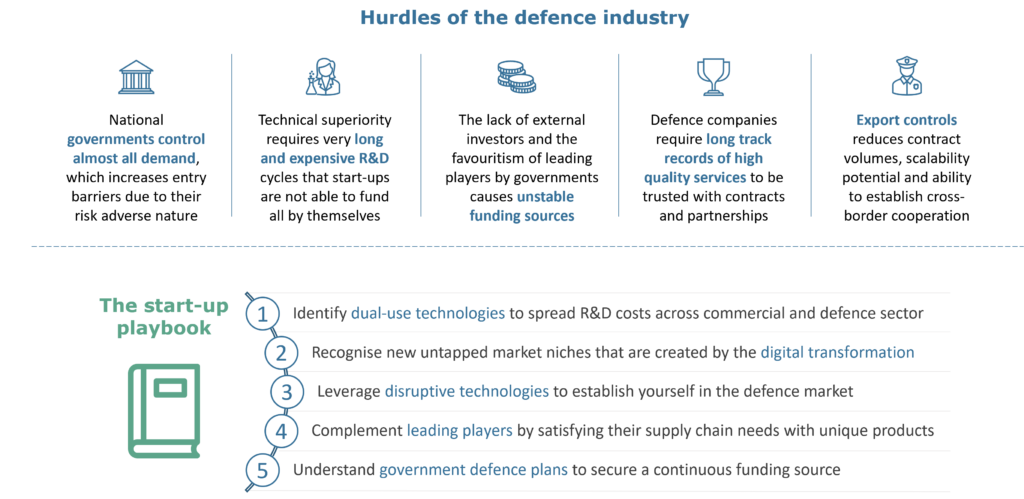Global geopolitical dynamism has always been the main driver for the defence industry. Recent conflicts brought to light serious concerns about national security issues and the current state of the civil and defence infrastructure across the world. Moreover, the rapid technological advancement in high-tech areas creates unprecedented challenges in the field of cybersecurity and critical information systems. As a response, many countries around the world are increasing their defence budget to address these topics.
As vital players in defence supply chains and drivers of innovation, start-ups and SMEs are increased beneficiaries of the growing defence spending. Nevertheless, navigating through the defence industry is far from a walk in the park and any start-up looking for a breakthrough in the defence sector needs to be well prepared for the challenges that they will come across.

The hurdles of the defence industry
The defence industry is a highly regulated, government driven industry with strict regulation. Procurement is primarily conducted on a national level, with demand controlled by national governments and export policies that limit cross-border partnerships. Since most governments are inherently more risk adverse, they tend to favour established players with long track records of success. Consequently, start-ups have to play the role of Tier 1 or Tier 2 suppliers. Compounding this problem is the fact that entering the supply chain of prime contractors can be extremely challenging. This requires momentum on both a company and personal level that is usually only obtained after years of high-quality services and direct negotiations with the prime contractors.
To aggravate the situation even further, defence products require long and expensive R&D cycles in order to achieve technical superiority. Start-ups can rarely fund the cycles themselves based on their commercial activity alone. Without a stable and continuous funding source due to lack of government contracts, available customers and external investors, the development of long-term plans and business growth are severely hindered.
A playbook for defence start-ups
After learning about the challenges of the defence industry, thinking about entering the market might seem a daunting endeavour. The situation is not as gloomy as it may appear at first sight though. In fact, there are many steps that start-ups can take to not only overcome these challenges but thrive in the market. These can be summarised in our playbook for defence start-ups:
- Leverage revenues from the commercial sector to invest in R&D that can also be used to develop defence products. Companies that can identify synergies between the commercial and defence markets are able to spread R&D costs efficiently.
- Tap into new market niches that are created by digital transformation. These market niches have lower barriers to entry, as they are often addressed with software-based solutions. These require less capital investment than traditional defence market segments.
- Find an innovative competitive edge to challenge and break into consolidated markets. Technological disruption is the main way for start-ups and SMEs to establish themselves in the market and to displace existing products.
- Build long-lasting partnerships with leading players by aligning your product with their technological needs. Start-ups that develop unique products that prime contractors need, quickly become trusted suppliers.
- Anticipate future government defence needs in order to secure sustained revenue sources. The ability to identify and adapt to technology roadmaps is fundamental in institutionally driven markets such as the defence industry.
Did you find this article interesting? Reach out to us for more information about entrepreneurial ecosystems, start-up support, or open innovation for the defence industry.